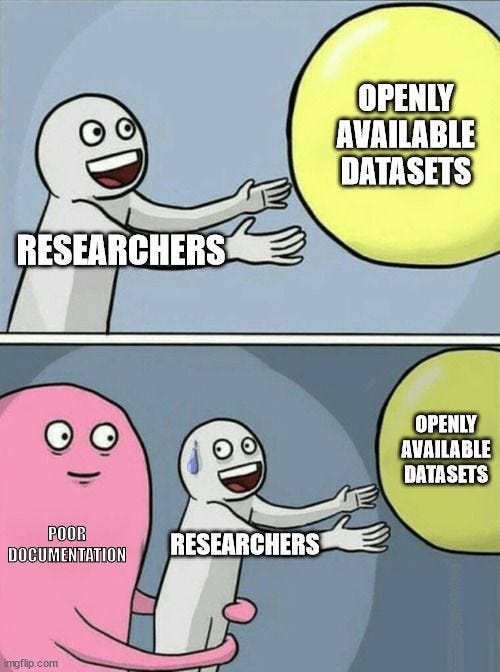RDM Weekly - Issue 004
A weekly roundup of Research Data Management resources.
Welcome to Issue 4 of the RDM Weekly Newsletter!
The content of this newsletter is divided into 3 categories:
☑️ What’s New in RDM?
These are resources that have come out within the last year or so
☑️ Oldies but Goodies
These are resources that came out over a year ago but continue to be excellent ones to refer to as needed
☑️ Just for Fun
A data management meme or other funny data management content
What’s New in RDM?
Resources from the past year
1. Data, Behind the Scenes
Are you looking for an opportunity to share lessons learned from a personal experience you’ve had working with data? Now is your chance! This free, online conference is in the planning phases and expected to occur Wednesday, September, 24, 2025, with times to be determined. There is currently a call for speakers who are interested in giving ~20 minute talks on real world data experiences, no matter how small or big the project was!
2. Standardizing Survey Data Collection to Enhance Reproducibility: Development and Comparative Evaluation of the ReproSchema Ecosystem
Ensuring consistency in survey-based data collection (question formats, response options, metadata) remains insufficiently addressed, particularly in longitudinal studies and multi-team research projects, where maintaining assessment comparability over time and across sites is critical. ReproSchema is an ecosystem that standardizes survey design and facilitates reproducible data collection through a schema-centric framework, a library of reusable assessments (standardized psychological scales, clinical questionnaires, and general-purpose surveys), and computational tools for validation and conversion. This study examines ReproSchema’s role in enhancing research reproducibility and reliability.
3. How to Share Data in Generalist Repositories
In this blog post the GREI (Generalist Repository Ecosystem Initiative) Community provides an overview of two recently published documents to help guide researchers sharing data in generalist repositories — a data submission best practices checklist, and a guide to including generalist repositories in a data management and sharing plan.
4. Intro to SQL
Data that we need to utilize and query is often stored in data sources such as databases or data warehouses. In these course materials, created by a team with the Fred Hutch Data Science Lab, you will learn how to connect and query databases using Structured Query Language (SQL). The course offers access to a Posit Cloud project that can be cloned to your own account so you can follow along with the exercises.
5. Faculty Research Data Management Policy
I recently came across this Research Data Management Policy for the Faculty of Geosciences at Utrecht University and it stood out to me as an exemplary model for developing a standard data management policy for an entire department, team, or organization. Check it out!
6. How Do Survey Respondents Decide Whether to Consent to Data Linkage?
Linkages between surveys and administrative data provide an important opportunity for social and health research, but such linkages often require the informed consent of respondents. This study uses experimental data collection across five different samples to study how consent decisions are made.
Oldies but Goodies
Older resources that are still helpful
1. Setting up a FAIR and Reproducible Project
Making your research or code project FAIR (Findable, Accessible, Interoperable, Reusable) and reproducible can feel like a chore. But if you have access to the right templates and resources, it can be quite the simple and rewarding task. This blog post provides tons of examples and templates for setting up FAIR and reproducible projects.
2. Data Management in Large-Scale Education Research
This practical guide, published one year ago this month, provides solutions for researchers navigating complex data ecosystems. While examples in this book are from the field of education, this book is applicable to many other fields as well. The book bridges the gap between theory and action, offering workflows, templates, and checklists to help researchers get started with managing data in a way that meets ethical compliance and aligns with open science principles.
3. Making Data Pipelines in R: A Story From A “Self-Taught” Perspective
In this fun and captivating talk from Posit Conf 2022, Meghan Harris invites participants to hear the perspective of a self-taught R user who used curiosity and patience to create a functional data pipeline in R for a local health department. The talk covers topics such as surveying data landscapes, file structures, saving yourself with data validation, thinking about pipeline sustainability, and more.
4. REDCap Training Series
If you are new to REDCap, or wanting to learn more, the Institute of Translational Health Sciences at UW has created a ton of great materials, including online modules divided into 3 skill levels (available to anyone after making a free account), open access slides, and other training materials.
Just for Fun
Thank you for checking out the RDM Weekly Newsletter! If you enjoy this content, please like, comment, or share this post! You can also support this work through Buy Me A Coffee.



